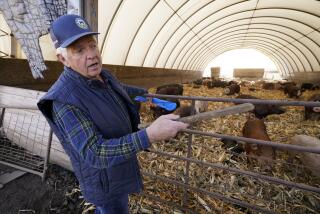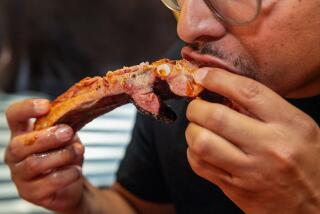Organically Raised Porkers Get Everything but Pie in the Sty
BOIZENBURG, Germany â This little piggy went to market, because organic farmers such as Holger Graichen can command top deutschemark for purebred piglets in these times of feverish fears over rampaging livestock diseases.
This little piggy stayed home, lounging away the days before his eventual date with the executioner on a cozy bed of fresh straw in a spacious pen with a view across the Elbe River valley.
And this little piggy, the one adopted at birth by a woman on the other side of the country, munches only biologically pure barley and home-grown oats to ensure that its meat will be free of the iodine additives to which its owner is deathly allergic.
The piglets bred and raised here by Graichen and his wife, Marie, are designer swine.
Each is fed and cared for according to customized instructions to address special consumer needs or to assuage the guilt and worry many Germans feel about eating industrially produced meat.
The Graichensâ offer to raise personalized piglets is a new twist on an old direct-marketing strategy, allowing consumers to buy a specific animal and control how it is treated and fed right up to its humanely swift slaughter. A local butcher cuts and grinds the meat, also according to customer preference, and the owner picks up the pork his or her family can consume with confidence and a clear conscience.
âWe want to give our customers the opportunity to come and see what we do--how we breed the piglets and how they spend their lives while they are growing,â says Graichen, who left a career in construction four years ago to take up ecological farming.
âA lot of people are angry at farmers nowadays because these livestock illnesses have exposed the conditions in which many animals are kept,â he says. âBut here they can see that the pigs live in comfort, at least until they have to be slaughtered.â
That knowledge is comforting to Friedel Scholz, a retired teacher from Rostock who wants to support the back-to-basics farming practiced by her grandparents before World War II.
âI donât want any more chemicals in my food--our world is already poisoned with all these additives and artificial substances,â says Scholz, who contends that industrialized farming is ruinous to both health and appetite.
âI canât bear all these horrible images of animals being packed in together and mistreated,â she adds, referring to the news pictures of livestock pyres that have been Europeâs response to foot-and-mouth disease. âI would really rather be a vegetarian, but our bodies need protein and are used to getting it from meat. At least with this leasing program, we know the animals were treated well while they were living.â
An added benefit, she says, is the chance to have the pounds of sausage produced by her pig prepared according to an old family recipe that cuts the salt and leans more on herbs for flavoring.
âI want to taste the sausage we used to make when I was a child,â she says, ânot the mouthful of nothing you get from the sausage you buy in stores today.â
Of the 1,200 piglets produced by the Graichensâ sows each year, most are sold to other organic farmers in northern Germany to be raised according to strict guidelines set out for the Bioland Assn. that forbid use of antibiotics, hormones or chemically modified feeds. But the Graichens keep about 200 piglets to raise according to their own ecological formula or to the specific needs of contracting customers.
Dagmar Braunschweig-Pauli lives hundreds of miles away in Trier, on the Luxembourg border, and learned of the Graichensâ customized-care option from a recent television report. She suffers from an acute allergy to iodine additives that she complains has spread through the food chain like a brush fire and put practically everything commercially produced off-limits.
âI had no idea that there were farmers in Germany willing to help people like me,â she says of the contract she has with the Graichens to feed her pig a stringently controlled mix of natural ingredients grown on a neighboring farm.
Pork produced by the Graichens and other organic farmers tends to cost at least 30% more than meat from mass-production farms, but consumers with special needs say they find the higher prices a reasonable trade-off for ensured food safety.
âI would pay 10 times the going rate for an egg guaranteed to be free of artificial iodine,â says the 49-year-old Braunschweig-Pauli, who heads a self-help network for other Germans suffering from the same allergy.
âAs it is,â she says, âI have to travel to France to get dairy products that are safe. Itâs a relief to know there is now a source of meat that I can eat.â
Although organic farming is booming because of the coinciding crises of foot-and-mouth and âmad cowâ disease, Graichen is the only ecological breeder of piglets in the state of Mecklenburg-Pomerania and the first nationwide to offer customized raising.
So far he has 25 contracts for specific diets and says heâs confident that the demand for biologically pure meat will snatch up the remaining output of his on-site production. And while he touts the quality of life afforded his piglets, he says he cautions customers against getting too close to the animals that will ultimately appear on their dinner plates.
âWe are a food producer, and food is not a toy or a pet,â the farmer says. âYou have to differentiate between humane treatment and humanizing the animals--otherwise, how could you slaughter and eat them?â
The piglets spend about eight months growing to their optimal 270 pounds. Each yields about 130 pounds of meat, half of it in steaks, chops, roasts and cutlets and the rest in various forms of sausage and smoked meats, Graichen says.
Those who contract for custom pork production must make two trips to the Boizenburg butcher to pick up their freezer-ready foods--immediately after slaughter for the fresh meat cuts and a few weeks later for the cured and smoked products.
âWhen we have enough individual customers we may be able to offer a delivery service, but at the moment there are too few to make that affordable,â the farmer says.
Factoring in slaughter and butchering costs with the six monthly installments of 107 marks (about $49), customers get their personalized pork for about $3.58 a pound, a price that is competitive with other organic products and even with mass-produced meat, according to some who buy it.
âIf you fry a piece of supermarket meat, half of it disappears in the pan because itâs just water,â says Horst Hochbruecke, a short-order cook from Hamburg who is prepaying Graichen for meat he will receive in November. âSo the organic stuff doesnât really cost more, and it tastes a whole lot better.â
More to Read
Sign up for Essential California
The most important California stories and recommendations in your inbox every morning.
You may occasionally receive promotional content from the Los Angeles Times.











